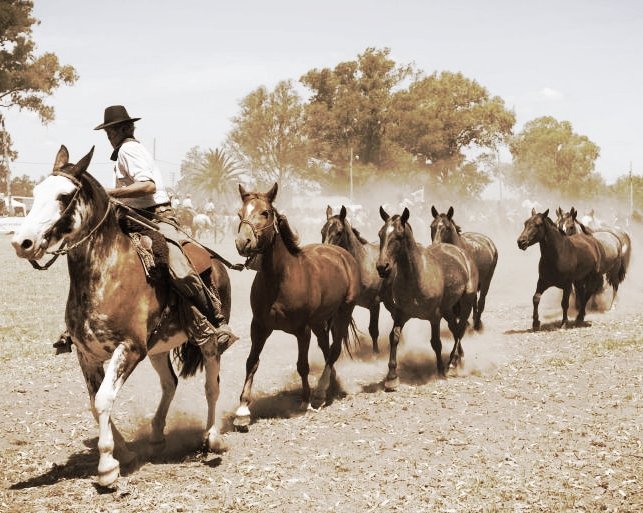
Gaucho Culture & Traditions
A tanned, weathered face, sitting under a chambergo, a slouching hat to guard the wearer from the heat of the midday sun, a poncho drawn loosely around the body, and sitting astride a horse, long, coiled whip in hand: there is no image more synonymous with Argentina than the gaucho. Central to argentinidad, the national sense of identity, the gaucho was a cowboy, famed for his skill at riding and with the facón, a thin, long knife used for fighting, killing and cooking animals, and working with leather. The gaucho, while all but disappeared now, still has a strong presence in the cultural identity of Argentina and the rest of the region.
Semi-nomadic, the gaucho followed the vast herds of cattle that roamed the Pampas, guarding, corralling, slaughtering, and selling these animals, as well as working with the leather and cooking the meat that they produced. The Asado, the traditional Argentine barbecue, grew out of the campfire cooking of the gaucho, and the simple style of seasoning and slow-cooking over an open flame is redolent of the basic conditions these men lived and worked under. Their lonely existence on the plains, with often only animals for company, also fostered the sense of importance given to the communal aspect of the asado, a rare opportunity for brotherhood and socialising in a tough, unrelenting life.
The term gaucho is believed to have originated in the late 18th century to describe wandering riders who lived a dangerous and not always legal lifestyle among the then largely wide herds of cattle in the region. The word itself might come from the Quechua term ‘huachu’, meaning orphan or vagabond, the Arabic ‘chaucho’, meaning a whip, or a word of Portuguese origin, ‘gaudeiro’, which was used to describe the people living and working in the Rio Grande do Sul: like much of the gaucho’s history, the word is wreathed in mystery and folklore.
Gauchos are crucially intertwined with other aspects of Argentine history and folklore, such as traditional forms of music and the struggle for independence in the early 18th century. The gaucho became a symbol of the resistant Argentine nation, independent, free-spirited, an outlaw with a strong moral compass. Courageous and loyal, hospitable but always yearning for the freedom of the open plains, the gaucho was never happier than when on his horse, working the plains, free to come and go as he pleased.



